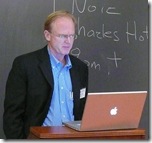Key Sentences at 2009 Free Culture Research Workshop
Oct 23 2009, Harvard Law School Hauser Hall 104, Free Culture Research Workshop 09. It is the first Berkman formal event I participated since I arrvied in Boston on 20 Oct. Here are some key sentences at the conference.
Terry Fisher: (quotes Walt Whitman’s Song of Myself) “Both in and out of the game, watching and wondering at it.”
[Note: This can be an excellent overall brief to the conference]
 Lessig: tech today makes possible explosion of non-market production. technology is reviving our earlier sense of how we can produce culture outside of the market paradigm. “professional sex” (production for market) vs “amateur sex” (remix and other free culture production)… My job as a policy maker is to make sure that both professional and amateur culture can survive…We are not communists…The market isn’t bad, therefore free isn’t inherently good.
Lessig: tech today makes possible explosion of non-market production. technology is reviving our earlier sense of how we can produce culture outside of the market paradigm. “professional sex” (production for market) vs “amateur sex” (remix and other free culture production)… My job as a policy maker is to make sure that both professional and amateur culture can survive…We are not communists…The market isn’t bad, therefore free isn’t inherently good.
[Note: it always happens in multi-discipline conferences: diverse backgrounds triggered the discussion on the definition of the topics. What is “free culture”?]
Lessig: “Strongly resist the idea that Free Culture is Creative Commons. It is not. That would be a failure for CC.”
Lessig: “Free Culture is not just non-market. It is hybrid relationships, it is one strategy to use to continue these relationships.”
Gabriella Coleman: “Maybe we can differentiate in the following way: Free Culture vs free culture (explicit vs aggregate dispersed phenomenon).”
I would say “Free Culture” vs “free culture” vs “(free) culture”. – Someone
[Note: forget who said that. while when I searching for this, i found another interesting post by Doc Searls (different context and different contents, but still worth reading)]
Mike Linksvayer: Lots of gnashing of teeth re what free culture is and relevance. Stop gnashing and quantify.
Aaron Shaw: “we are moving into the Freudian unconscious of the Free Culture movement…the terrain we don’t want to think about it.
Giorgos Cheliotis: “I’d quote: If you want to be wildly interdisciplinary, you must be epistemologically humble.”
[Donnie Note: fortunately, ppls shifted to other topics other than the definition…]
Lessig: “If Free Culture is innate it doesn’t hurt to educate for it..:) but if it isn’t innate, we should educate to create it.”
Edward Harran: “We need to move from a profit-driven economy to a values-driven economy.”
Mike Linksvayer: Need to have case studies of failed free culture platforms.
Clay Shirky: “Failure is a feature, not a bug.”
[Donnie note: Free Culture as a movement, or as a practice, it is a problem]
Mayo Fuster Morell suggests that free culture may be considered as a social movement because it challenges established production systems.
Thomas Haigh: “Are we researching Free Culture practices or the movement?”
Philippe Aigrain: “We must research the practices if we are to research the movement. Only the global landscape gives you a picture.
Elizabeth Stark: “Where does the movement end and the research begin?”
Kristin Eschenfelder: I think the movement is helpful in consciousness raising that starts people asking questions.
Donnie Dong [that’s me]: If free culture has to be a global movement, it must be expanded from sth. about IP to the free dissemination of the information. The reason is: in some late-developed countries like China, the things hindering the “free culture” are far beyond the intellectual property system. On the contrary, the CC’s promotion in China improved people’s consciousness of copyright protection, interestingly.
lessig “We should think about ways to study interesting cultural difference.”
“Free Culture can be re-appropriated in each cultural context. Grows very rapidly when there is a challenge. It’s post-modern.”
medialabprado Is Twitter part of the Free Culture movement?
Mayo Fuster Morell: Facebook is “non-market” in term of users “contributions without monetary retribution”, but not in terms of Facebook company profit.
[Donnie’s Note: the following voices are very essential]
Herkko Hietanen: “Is this a research or an advocacy workshop? Why are there no dissenting voices around Free Culture and Creative Commons? Are here all Larry’s fans.”
“As an academician, I am not interested in the ‘social movement’.”
[Donnie’s Note: see the references shared by the attenders via twitter]
BiellaColeman http://www.kimberlychristen.com/ —> works on the limits of FC in the context of indigenous groups
Michael Brown: Who Owns Native Culture? Overview of the issues with cultural secrecy:
http://www.williams.edu/go/native/
concept of ‘recursive public’:
http://p2pfoundation.net/Recursive_Public
“The Moral Economy of the English Crowd.”
http://en.wikipedia.org/wiki/Moral_economy
The trouble of Free Riding
http://www.freedom-to-tinker.com/blog/tblee/trouble-free-riding
Open Educational Resource:
http://www.oercommons.org/
Digital Labor Conference Nov. 12-14 New York
Another talk by Lessig:
http://www.youtube.com/watch?v=fCyaF-Umod0
Some script from: http://twitter.com/metamemette
Photo from (sorry Jude use your copyrighted work): http://www.flickr.com/photos/jyew/
